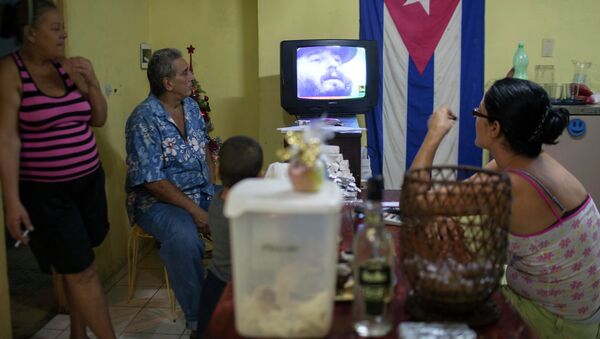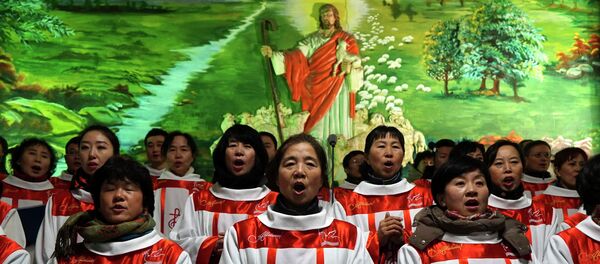MOSCOW, December 25 (Sputnik), Ekaterina Blinova – Even though it has been banned for more than 30 years, Christmas has been regaining popularity in Cuba since 1998; the thaw in US-Cuba relations has become an early holiday gift for the nation.
"Christmas was a very deep-rooted tradition in Cuba. It was interrupted for 38 years, which is no small thing, and yet it made a comeback," emphasized Jose Felix Perez, the secretary of Cuba's Conference of Bishops, as cited by Agence France-Presse.
In 1959 Fidel Castro, the iconic national leader, toppled dictator Fulgencio Batista and declared it an atheist state.
Ernest Hemingway — Christmas in Cuba 1957 #ErnestHemingway #Christmas #Cuba http://t.co/PikEVInPtN pic.twitter.com/IzQEwoqkap
— Cooper & Hemingway (@coophem) 11 декабря 2014
Thus, the period between 1969 and 1998, is known in the country as Las navidades silenciadas or "The Silent Christmases."
In 1998, during his visit to Havana, Pope John Paul II forced President Castro to revive the holiday, points out the Independent, adding that Cubans, mostly Catholics, "rushed out to buy Christmas trees, decorations and religious icons."
Today, in the country, where Catholicism peacefully co-exists with local traditions and African religions, the holiday is celebrated with a hope for steady economic growth and prosperity.
Cuba celebrates first Christmas Eve after reconciliation with US: Havana: People in Cuba celebrated the first… http://t.co/r1O35nhZoD
— Cuba News Links (@dlcubanews) 25 декабря 2014
Each year, towns across Cuba erupt in colorful celebration for days before Christmas http://t.co/c0bLD2W9hH pic.twitter.com/4frMy3Kn3P
— Smithsonian Magazine (@SmithsonianMag) 24 декабря 2014
Cuba prepares for Christmas after 38 years of ban http://t.co/zP7Tel5ggW #Xmas #Cuba
— Devasia Joseph (@devasiajoseph) 25 декабря 2014
Although Christmas had been banned here for 30 years, Cubans have preserved "the holiday's sincerity, in ways it has been lost elsewhere," underscores Enrique Sacerio Gari, a professor of Hispanic-American studies at Bryn Mawr College, the US.
"Cuba differs from others in that, in this 30-year period, Christmas was marketed around the world as a business, and the religious aspect of it largely went away. Cuba wasn't part of that commercialization of the holiday, so to speak," he stressed, as quoted by Quartz.





